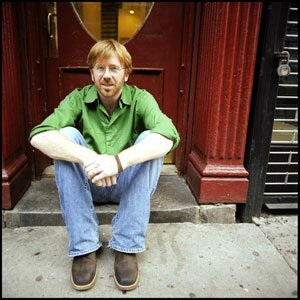INTERVIEW- Fun times: Why Anastasio loves going it alone
The 2004 Phish concert in Coventry, Vermont marked the end of an artistic partnership for the history books. Over 20 years and zillions of fans had established guitarist Trey Anastasio's last project as the big, bad, not-even-Dave-Matthews-can-argue-with-this grandfather of jam rock. After the 70,000-strong crowd finally dispersed at the end of that wet August weekend, Anastasio and his bandmates did the same, thrilled to be able to let their band die in the middle of the community it had built for them.
Where does an archetype go next? A stylistic U-turn is one possibility, but Anastasio hasn't gone that route– solo albums like Shine and Bar 17, his latest, are also marked by the bubbly artistic nonchalance of an influential musician unafraid of having fun in the spotlight. If anything, Anastasio's solo projects reaffirm the controlling majority he held in Phish's creative process.
The Hook: Bar 17 is a great name.
Trey Anastasio: I started this record before the record that came out before it, Shine. That made it feel like a title track. If you have two bars of 8, bar 17 would be where the story starts.
The Hook: Wait, so really you're talking about "beat 17"?
Trey Anastasio: Exactly! Bar 17 would be the middle of the second verse. It should have been called "Beat 17." Wow. That's a really bad way to start an interview.
The Hook: It conjures thoughts about improvisation, which is what Phish was best known for. How much of that is going on in this project?
Trey Anastasio: The process feels very similar. The big difference is that I learned from being in Phish that the quickest way to music that resonates is to get to know the people you're playing with– find a way to find whatever they have to offer and create a framework where the people can be at their best. I learned that from Miles Davis and Frank Zappa and Duke Ellington and all the really great band leaders; all the musicians played better with those bandleaders than any other time in their careers. John McLaughlin played better with Miles than with anyone else. I tried to do that as much as I could.
The Hook: Last time you played here, it was opening for the Rolling Stones with 70 Volt Parade. Did you do that with them, too?
Trey Anastasio: Right after Coventry, my band, my crew– it all was coming apart at the seams. I ended up temporarily working with a different producer who introduced me to the people in that band. They weren't people I found myself. But I decided to take a risk. Any group of musicians put in a room together– if they really believe in each other– can make it happen. It was totally uncharacteristic for me, it was a complete roll of the dice. But reality set in as we went on tour– it just wasn't happening.
The Hook: Why not?
Trey Anastasio: The title track, that's them. They just played so well, it was so airy and light, but nobody was watching. I love the way they were playing. They were un-self conscious. But really quickly, they started jumping on the Internet. People didn't like them, and they read some really awful stuff. It was really sad. People were just ragging on them, and they started to play completely self-conscious music. But it was inevitable. I was expecting it– people were lambasting me my whole life. But they weren't used to people hating them. They just started playing like crap. Can you imagine going up on stage after reading all these people telling you you're wearing the wrong pants?
The Hook: You've played on some DMB dates and as part of Dave's solo project. Which did you prefer?
Trey Anastasio: I think Dave writes really great songs. It has nothing to do with me being around or any of the other guys. I think there was an understanding that it was a solo album, and it was about the songs, and I think that's when he's at his best; he's so good when he's quietly honest. Some of the rooms we played in I had been in with Phish, and our way of getting the crowds going was with more high energy. Dave was more locked in the crowd when we got really quiet. It was a great lesson for me, seeing someone access the live energy in a different way than I would.
The Hook: With all the success you've had in the music industry, why did you feel the need to start your own record label for this album?
Trey Anastasio: There are so many people in the halls at these major record labels who are scared of losing their jobs... there's a real environment of general terror. I just had so many uncomfortable conversations with both Elektra and Columbia. It was such a battle, you can't even believe the conservative attitude that goes on in some of these record labels. Conversations about how big the font should be, because you have to be able to see the guy's name from across the room next to Usher's CD. I had a hundred conversations like that. After a certain number of them, you just don't even want to answer the phone anymore. Now I have my own label, I'm completely happy. The record label is me and Coran and Patrick Jordan, there's no intent, there's no pressure of any kind, no real overhead or anything. Everything about that CD– the font, the cover– was my decision. I'm so happy, I'm never going back.
Trey Anastasio plays the Charlottesville Pavilion in a WNRN benefit show Friday, October 13. Tea Leaf Green opens. Doors 6pm. $37.50

Trey Anastasio
PUBLICITY PHOTO
#